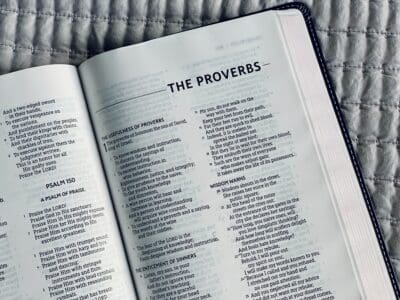Leaders are people who set out on a journey and take others with them.
The Bible tells us of two leaders who moved in very different directions. Ahab took a journey of rebellion against God, and thousands of people went with him. Elijah chose a different path—a journey of obedience to God, and he found it lonely. If you’re a Christian today, you’re probably experiencing this in some way, shape, or form.
Ahab and Elijah were both leaders of vast influence. They led people in different directions, and their lives had extraordinarily different outcomes.
A Warning to Heed
Ahab reigned over Israel for twenty-two years—an entire generation. He brought political stability (and with it came economic prosperity), but evil went from bad to worse under his leadership. Ahab’s story tells of the progress of evil in a person’s life, and in a society. It begins with disobeying the command of God. It continues by subverting the worship of God—if this god does not suit us, we will reshape the god in our own image. It intensifies in provoking the anger of God, and it ends up with men and women ignoring the warnings of God.
It’s clear that our beloved nation is on this same path today. We define our own morality and choose our own gods. God says “I Am who I Am,” but instead of bowing before Him and believing God is who He says He is, we redefine God, and we act as if God is who we say He is.
What does God do when a culture is charging down the broad road? He raises up men and women who walk on the narrow path. And that is what God did in Elijah.
An Example to Follow
God brings out His brightest light in the hardest place at the darkest time. If you find yourself in a hard place at a dark time, do not be surprised at this. This is the way God works.
One writer says:
“To see Elijah appear like this, unexpected and unheralded, reminds us that we need not despair when we see great movements of evil achieving spectacular success on this earth. We can be sure that God, in unexpected places, has already secretly prepared his counter movement. Therefore, the situation is never hopeless where God is concerned. At the height of the triumph of evil, God is there, ready with His man and His movement and His plans to ensure that His own cause will never fail.” [1]
Try to imagine the scene in 1 Kings 17. Somehow Elijah gets into the presence of the king and says to Ahab:
As the Lord the God of Israel lives, before whom I stand, there shall be neither dew nor rain these years, except by my word (1 Kings 17:1).
Where did Elijah find the kind of courage to tell the truth? Where can we find this kind of courage?
1. Stand in the presence of God.
Picture the palace as Elijah walks up to Ahab. The driver of Ahab’s chariot stands before him ready to move at his word. The waiter stands before Ahab, ready to serve food or drink at the movement of his finger. All around the room, the king’s servants stand before him, ready at any moment to respond to his direction.
1 Kings 17:1 tells us that Elijah says, “I stand before the Lord.” This means to come to the place where you are ready, available, and responsive to whatever He commands you to do. In the darkness, we need men and women who are standing before the Lord. Is that you?
2. Believe the Word of God.
What could Elijah do—just one man surrounded by a tide of evil, more flagrant than in any previous generation? He could believe the Word of God. And as he searched the Scriptures, he would have found this promise:
Take care lest your heart be deceived, and you turn aside and serve other gods and worship them; then the anger of the Lord will be kindled against you, and he will shut up the heavens, so that there will be no rain, and the land will yield no fruit, and you will perish quickly off the good land that the Lord is giving you… (Deut. 11:16-17).
If God’s people turned aside and worshipped other gods, He said there would be no rain. So, Elijah began to pray, “O, God, what you warned about is everywhere. Nobody cares about your Word. They think your Word is only words. They think it is only sociology, only psychology. Do what you said.”
3. Pray for the will of God.
Elijah… prayed fervently that it might not rain, and for three years and six months it did not rain on the earth (James 5:17).
If there’s no rain for three years, then cattle and people die, and famine ruins the economy. Elijah prayed fervently that God would wreck the economy of his own beloved nation! What kind of prayer is that?
Even though Elijah himself would personally share in the suffering, he prayed that it would happen. Why? Elijah cared more about God’s glory than his own comfort. He cared more about peoples’ eternal destiny than their physical well-being. Elijah knew that it is better to endure any suffering in this world, and turn to God, than to enjoy any comfort in this world, and to live without Him.
4. Speak in the name of God.
Standing before the Lord gave Elijah courage to stand before the king. His engagement with the Word, and his submission to God’s will, enabled Elijah to speak the truth to Ahab: “The Lord the God of Israel lives!”
Ahab had never thought about that. He had thought of religion as a branch of sociology to be manipulated for the benefit of politics, an expression of human spirituality, a force in the community that could be used for good social purposes. He had never seriously considered that there was a God who really is. Suddenly, perhaps for the first time, the thought enters Ahab’s mind: What if there really is a God? What if the Lord, the God of Israel lives?
A Better Example than Elijah
Reading about Elijah standing before the Lord, interceding for the people of God, and speaking His Word, makes me think about Jesus, who says:
The gate is wide and the way is easy that leads to destruction, and those who enter by it are many. For the gate is narrow and the way is hard that leads to life, and those who find it are few. So enter by the narrow gate (Matt. 7:13-144).
To all who are ready to walk the narrow way of faith and obedience to God, there’s good news today: Jesus stands before the Father for us. He is the Word of God to us. He opens the seals to enact the will of God for us.
Jesus speaks a better word than Elijah did. Elijah spoke a word of judgment so that people would seek mercy, but Jesus speaks a word of mercy to people who deserve judgment. That’s the gospel!
Thank God we are not called to go out and somehow pray for judgment on the world, but in Christ’s name we are to call people to repentance and we are to offer grace to people in this world.
Where are you today?
We live and work with thousands who are on the broad road with Ahab, choosing their own morality, shaping their own god, provoking the Lord to anger and ignoring His warnings. I invite you to step out from the crowd and offer yourself to God today. Place yourself under His authority; tell Him you’re ready to do whatever He asks of you. Ask Him to make you a person who really believes His Word, and to help you seek His will, even when it’s going to be costly for you. Ask Him to give you courage—to speak in His name and be light in this dark world where you’ve been placed.
_____







